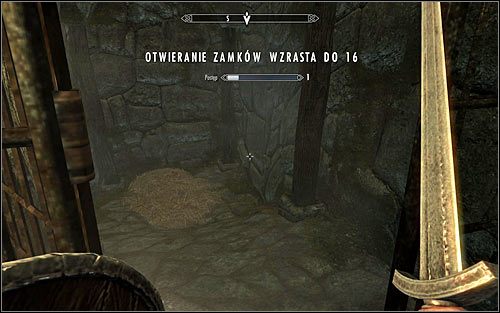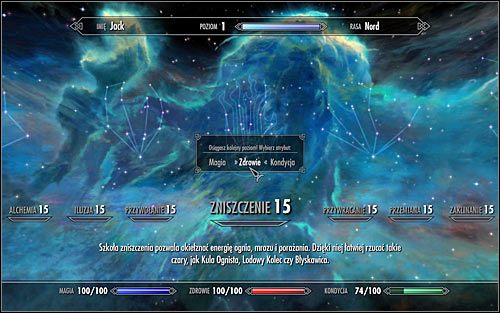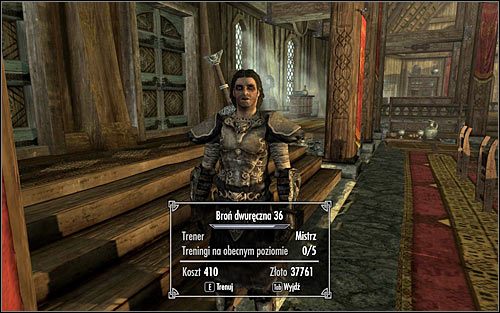This section of the TES V: Skyrim guide contains vital information on character development. You will discover how to raise skills and access higher levels of experience.
Basic Information

The Elder Scrolls V: Skyrim has a unique character advancement system where characters don’t level up by earning experience points. Instead, the process is based on increasing their skills. There are 18 skill groups in the game, and each group can be improved by performing tasks related to it. For instance, if you want to improve your Archery skill, you have to use the bow frequently. Similarly, if you want to enhance your Destruction skill, you must cast spells from this magic school. Convincing other characters to change their minds about something you’re interested in will help you raise your Speech skill. Once you’ve performed enough actions within each skill group, you’ll earn one point and increase your skill level (most skills begin at 15 points, and you can raise them up to 100 points). A progress bar displays on the screen to indicate your progress. You can advance to the next level by filling the bar, and you can do this by improving one skill or multiple skills.

After filling the progress bar, you’ll be notified of the possibility to advance to the next level. You can press the TAB key and select the upper button to do so easily. Two things are important when gaining new levels. Firstly, you can choose which of the main attributes you want to increase by 10 points (screen above) after every advancement. You should choose attributes that complement your play style. For example, as a mage, you should develop your mana skill. Secondly, you’ll receive one skill point after every advancement, which you can spend on perks. Each constellation (skill group) has a variety of perks to choose from, and you can learn more about them in the next section of this chapter. You don’t have to spend the skill points right away. It’s better to wait until better perks become unlocked (usually when you increase your skills), as some perks are linked.

In addition to performing tasks related to the skill group, there are other ways to increase your skills:
- Obtaining skill books – By reading a skill book, the skill it’s associated with will automatically increase by one point. The main benefit of this method is that the progress bar is filled, not only improving your skills but also helping you gain new experience levels. However, the downside is that each book can only be used once and then becomes obsolete (although it can still be sold). A comprehensive list of skill books can be found in the Listings section.
- Consulting skill trainers – Purchasing a lesson from a trainer (as seen in the screenshot above) will automatically increase the skill they specialize in by one point. The main advantage of this method is that completing lessons also fills the progress bar, helping you improve your skills as well as gain new experience levels. On the other hand, the major drawbacks are the high cost of lessons and the limit of five per level. However, this can be easily remedied by returning to the trainer after leveling up to purchase an additional five lessons. A comprehensive list of skill trainers can be found in the Listings section.
- Equipping items that enhance particular skills – The main benefit of this method is that the bonus is often significant, sometimes exceeding 10 points. However, the major drawback is that the bonus is only active while wearing the magical item, meaning you cannot rely on these items to guarantee early access to better perks.
FAQ
What is an introduction?
An introduction is the first part of a written or spoken discourse that provides an overview or background information about the topic. It aims to grab the attention of the audience and give them a clear idea of what to expect from the rest of the discourse. In academic writing, an introduction typically includes a thesis statement that presents the main argument or purpose of the paper. It may also provide some context or historical background, define key terms, and outline the structure of the paper.
What are skills?
Skills are the abilities and competencies that enable individuals to perform tasks effectively and efficiently. They can be acquired through education, training, and experience, and are often specific to a particular occupation or field. Some common types of skills include technical skills, such as programming or accounting, communication skills, such as public speaking or writing, and interpersonal skills, such as teamwork or leadership. Employers often seek candidates with a combination of hard and soft skills that are relevant to the job.
How can I improve my skills?
Improving skills requires deliberate practice, feedback, and reflection. One way to improve technical skills is to take courses or attend workshops that teach the latest techniques and technologies. Communication and interpersonal skills can be developed through activities such as public speaking, role-playing, and team-building exercises. Seeking feedback from mentors, colleagues, or coaches can help identify areas that need improvement and provide guidance for growth. Reflecting on past experiences and analyzing successes and failures can also help develop self-awareness and enhance learning.
Why are skills important?
Skills are important for personal and professional growth, as well as for success in the job market. Having a strong set of skills can increase employability, job satisfaction, and earning potential. In addition, skills such as communication, problem-solving, and teamwork are essential for building relationships and navigating social situations. Developing skills can also lead to a sense of accomplishment and self-confidence, as individuals gain mastery over tasks and challenges.

James, a young and enthusiastic gamer. With a passion for gaming, he personally plays and experiences the games he writes about, providing authentic and insightful content to fellow gamers.
